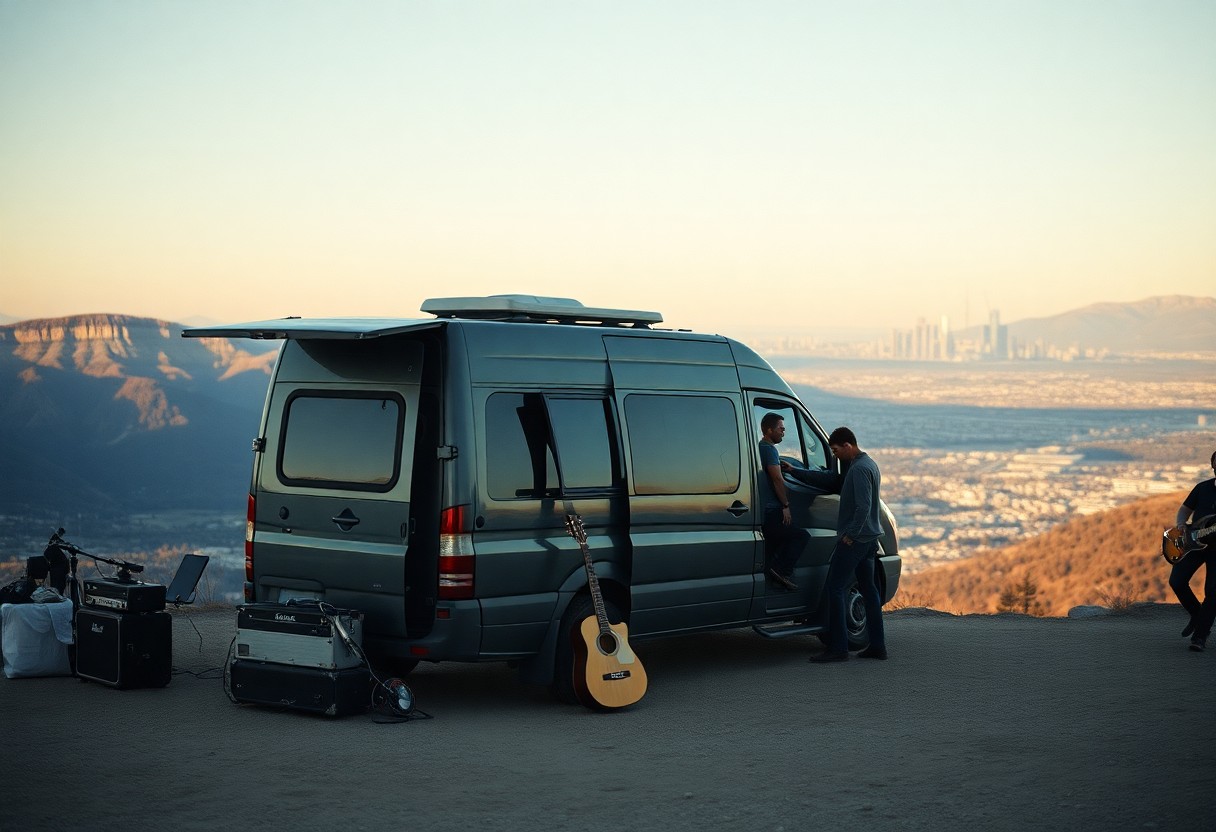The Ultimate Guide to Thriving on Tour: Essential Tips for Band Artists
With extensive time spent on the road, touring can be both exhilarating and exhausting for you as a band artist. To ensure that your experience is as rewarding as possible, it’s vital to prioritize planning, maintaining your health, and engaging with your audience. This guide will provide you with valuable tips that can help you navigate the challenges of touring while maximizing your creative output and personal well-being. Get ready to take your performances to the next level!
Key Takeaways:
- Plan your route and schedule ahead of time to maximize performance opportunities and minimize travel fatigue. (Consider using tools like Bandsintown for Tour Dates)
- Establish a budget that encompasses travel expenses, accommodation, food, and contingencies to keep finances in check. (Explore budgeting apps like Mint)
- Utilize social media and local outreach to promote shows in each city and connect with potential fans. (Learn more about social media marketing for musicians on platforms like Hootsuite)
- Prioritize band health and wellness by incorporating rest days, nutritious meals, and exercise into your tour routine. (Find healthy eating tips on MyPlate)
- Network with other local artists and venues to open doors for future collaborations and gigs. (Explore online music networking platforms like Music Gateway)
- Invest in reliable gear and backup options to prevent technical issues during performances. (Check out reputable music equipment retailers like Sweetwater)
- Document your journey through photos and videos to engage your audience and create lasting memories. (Learn about engaging video content on YouTube Creators)
Pre-Tour Planning
Your journey begins long before you hit the stage. Pre-tour planning is imperative for a smooth and successful experience on the road. It involves thorough research, organization, and communication among band members. By laying down the groundwork early on, you set the tone for a tour that is not only productive but also enjoyable. Don’t skip this step, as it can determine the overall vibe of your tour.
Budget and Financial Management
Across your tour, managing finances effectively can save you from unexpected pitfalls. Establishing a budget that covers all expenses, from fuel to accommodation, ensures you remain financially sustainable. Keep track of your income from ticket sales and merchandise to allocate funds wisely. By prioritizing your expenditures, you can avoid overspending and stay focused on your performances. (Consider using accounting software like QuickBooks Self-Employed)
Tour Route Optimization
Optimization of your tour route can lead to significant savings in time and costs. Planning the most efficient path between venues minimizes travel time and maximizes your opportunities to engage with fans. Consider factors such as travel distance, driving hours, and accommodation availability when mapping out your itinerary. A well-planned route can help maintain your energy levels and keep your team motivated throughout the journey. Further enhancing your route planning involves using reliable navigation apps and analyzing traffic trends. This allows you to avoid potential delays and adjust your schedule accordingly. Be flexible and open to changes if unforeseen circumstances arise, ensuring you stick to your core plan while allowing for spontaneity. Good route optimization not only saves on fuel costs but also gives you more time to relax, rehearse, or explore new cities. (Utilize apps like Google Maps or specialized route planners like Roadtrippers)
Equipment and Vehicle Preparation
Optimization of your equipment and vehicle is imperative for a hassle-free tour. Ensure all your gear is in top condition, and conduct thorough checks on microphones, instruments, and sound systems before hitting the road. Additionally, confirm your travel vehicle has been serviced, with special attention to tire health and fluid levels. These preparations can prevent delays and unexpected repairs. (Find vehicle maintenance checklists online at reputable auto service websites) In addition to checking the condition of your instruments, packing a spare gear kit can prove invaluable in case of accidents or malfunctions. Double-check that all necessary equipment is accounted for, and scout for any local rental options should the need arise. Having a contingency plan and being proactive about your gear will ensure that you’re always ready to deliver an outstanding performance, no matter where the road takes you.
On-the-Road Logistics
Some aspects of touring require meticulous attention to detail, especially when it comes to logistics. Ensuring that everything runs smoothly can make your experience much more enjoyable and successful. From transportation to communication with the venue, being organized will help you focus on performing your best.
Transportation and Load-in Procedures
One of the first things you should consider is your transportation and load-in procedures. Proper planning for how you and your equipment will get to the venue is vital. Be clear about who will be responsible for driving and managing gear during transport to avoid any last-minute chaos.
Venue Communication and Technical Requirements
At all stages of your tour, effective communication with the venue about your technical requirements will streamline your setup process. Establishing a point of contact at the venue can help clarify your needs and ensure that everything from sound checks to lighting setups is executed flawlessly. Technical specifications should be communicated well in advance, including your equipment list, sound system needs, and staging requirements. By providing accurate information, you reduce the risk of issues on show day and show your professionalism, fostering good relationships with venue staff.
Accommodation and Travel Arrangements
Beside logistics, focus on your accommodation and travel arrangements. Ideally, you want accommodations that are conveniently located near your venue to minimize travel time and fatigue. Consider your band’s needs when selecting amenities and room setups. (Explore booking platforms like Booking.com or Airbnb) The right accommodations can significantly impact your performance quality, as they offer a space to recharge. Look for options that include Wi-Fi for communication and areas for relaxation. Make sure you also allow for ample travel time between locations, to avoid undue stress and to arrive ready to perform.
Performance Preparation
All performers must prioritize familiarizing themselves with the venue and setlist to ensure a seamless show. Well-planned preparation enables you to concentrate on delivering a memorable performance. By organizing rehearsals tailored to your specific set, you will enhance not only your confidence but also your connection with the audience. Efficient performance preparation ultimately leads to better energy and engagement on stage.
Sound Check Protocol
Along with setting the stage for your performance, sound checks are vital for ensuring optimal sound quality. This is your opportunity to test equipment, adjust levels, and address any potential issues before the audience arrives. Make sure to coordinate with your sound engineer and pass along any specific requirements to avoid last-minute surprises.
Stage Setup and Equipment Maintenance
The way you set up your stage can significantly affect your performance. Ensure that your equipment is in top condition, including instruments, amps, and microphones. Conduct a thorough inspection, and check for any signs of wear or malfunction before the show. Consider the layout of the stage as well, ensuring that all performers have adequate space and visibility. Another important aspect of stage setup is understanding the venue’s layout and acoustics. This includes positioning your equipment for the best sound projection and ensuring proper electrical access. Clear communication among band members about equipment handling can prevent unforeseen mishaps on stage. Also, don’t hesitate to carry spare gear for any critical items that might fail during the performance.
Backup Plans and Emergency Solutions
Sound checks alone won’t mitigate every issue you’ll encounter on the road. You need effective backup plans for major equipment failures, sudden illness, or unexpected venue changes. Having contingency strategies ensures you won’t be caught off guard, allowing you to maintain your focus on performing. Hence, it’s wise to invest time in planning for potential setbacks. Assemble a comprehensive emergency kit featuring necessary tools, extra cables, and spare instruments. Additionally, discuss with your team about alternative formats for shows, like acoustic sets, in case of emergencies. Being prepared demonstrates your professionalism and commitment to delivering the best experience for your audience, no matter the circumstances.
Health and Wellness
Unlike many might assume, touring as a band artist can take a significant toll on your health and wellness. The rigors of constant travel, late-night shows, and changing environments can leave you feeling drained. It’s vital to prioritize your health to sustain your creativity and performance quality on the road.
Physical and Mental Health Management
With the demands of touring, prioritizing both your physical and mental health is vital. Make time for daily exercise, whether it’s a quick workout or a walk, and ensure you engage in mindfulness practices like meditation or deep breathing to combat stress. This balance will not only keep you fit but also sharpen your focus for performances. (Explore mental health resources at National Alliance on Mental Illness (NAMI))
Nutrition and Rest Strategies
Before you hit the road, plan your meals and sleeping arrangements to maintain your energy levels. Eating balanced meals and getting sufficient sleep can drastically improve your touring experience. Make use of local grocery stores for healthy snacks and set a designated sleep schedule to combat fatigue. (Find tips for healthy eating on the road at Academy of Nutrition and Dietetics) But the key to optimal nutrition and rest lies in planning. Carry healthy snacks like nuts or protein bars for easy access during long drives. Stay hydrated and avoid excessive caffeine or alcohol, which can disrupt your sleep patterns. Implementing a structured routine for rest will allow your body to recover, helping you perform at your best during shows.
Team Morale and Conflict Resolution
Along your journey, maintaining team morale is vital for a positive experience. Regularly communicate with your bandmates and address any issues that arise to foster a supportive environment. Collective decision-making can minimize conflicts and enhance team cohesion. Team dynamics play a significant role in your overall success on the road. Building strong relationships and addressing disagreements before they escalate will keep your focus on the music. If conflicts arise, tackle them openly; discussing feelings and finding compromises can not only resolve issues but also strengthen your bond as a group.
Fan Engagement and Promotion
After hitting the stage, connecting with your audience is key to turning fans into lifelong supporters. Engage with them during the show, through post-concert interactions, and through various promotional activities. By fostering these connections, you create a loyal fan base that will follow you on the road and support your music both online and offline.
Social Media Management
Around the clock, your social media presence plays a vital role in amplifying your reach. Utilize platforms like Instagram, Twitter, and Facebook to share tour updates, behind-the-scenes glimpses, and special announcements. Consistent engagement keeps your followers connected and encourages them to share your content, thus attracting new fans to your music. (Explore social media management tools like Buffer or Later)
Merchandise Sales Optimization
Behind every tour is a potential profit, and effective merchandise sales can maximize your revenue. Offering well-designed items that resonate with your audience not only enhances their experience but also serves as a lasting memory of your performance. Price items strategically and promote them actively to boost your sales while on the road. (Find tips on merchandise for bands at Bandzoogle) Merchandise can become your best asset during tours if you focus on variety and quality. Choose items that reflect your brand, such as apparel, accessories, and unique memorabilia. Ensure that your merchandise stands out by offering exclusive items available only during specific shows, which can create a sense of urgency among fans. Set up an appealing display at your merch booth and actively engage with fans as they browse, ensuring they leave with something special.
Meet and Greet Organization
The opportunity to interact face-to-face with your fans can have an enormous impact on their loyalty to your music. Organizing meet and greet sessions gives your audience a chance to connect with you on a personal level, fostering a deeper relationship and enhancing their overall concert experience. At every venue, establish a structured approach for your meet and greet sessions to manage time effectively and ensure that every fan feels valued. Create a sign-up system or a raffle to keep things organized and limit wait times. Consider adding a photo opportunity and personalized experiences, like signing a piece of their merchandise. This personal touch creates memorable moments for your fans and strengthens their bond with your brand.
Legal and Business Considerations
Once again, as you begin on your touring journey, it’s necessary to understand the legal and business considerations that can significantly impact your success. From contracts to permission for performance, being informed will help protect your interests and ensure everything runs smoothly. Familiarizing yourself with relevant laws and regulations in each market you enter will be vital to avoid potential complications and delays while on the road.
Contracts and Insurance
After securing gigs, you need to ensure you have solid contracts in place. These documents lay out the terms and expectations for both you and the venue/promoter. Additionally, having the right insurance will protect your band from unforeseen circumstances that could affect your performance or equipment. (Learn about entertainment law at organizations like the American Bar Association – Entertainment and Sports Law Forum)
Performance Rights and Licensing
With touring, understanding performance rights and licensing is key to legally playing your music. This entails obtaining the necessary permissions from copyright holders and ensuring you’re compliant with local regulations. (Learn about Performance Rights Organizations in the US at ASCAP, BMI, and SESAC) Due to the varying laws across regions, always research the performance rights organizations (PROs) in each area where you’ll be playing. This will help you navigate the licensing landscape, avoiding potential fines and ensuring that you are able to profit from your creations while respecting the rights of other artists.
Financial Record Keeping
On your tours, maintaining financial record keeping is vital for tracking income and expenses. This organization is not just important for tax purposes but also for understanding your profitability and making informed decisions about future performances. (Explore accounting software for small businesses like Xero) In fact, proper financial management can turn your touring efforts into a sustainable business. Keeping tabs on your earnings, expenses, and invoices will help you identify financial trends, allowing you to adjust your strategies and maximize your income potential while on the road.
Final Words
Now that you have a solid understanding of crucial touring tips for band artists, you can approach the road with confidence and purpose. Focus on planning your logistics, maintaining a healthy lifestyle, and fostering relationships with fans and fellow musicians. Embrace each experience, for it contributes to your growth as an artist and enhances your overall performance. With a bit of preparation and a positive mindset, you can make the most of your journeys and create unforgettable memories along the way.
FAQ
Q: What preparations should a band make before going on tour? A: Before hitting the road, artists should create a comprehensive checklist. This includes ensuring that all instruments are in good condition, packing extra strings and supplies, and confirming travel arrangements. It’s also important to have a solid setlist prepared and to rehearse thoroughly. Additionally, consider creating a budget to manage expenses related to fuel, lodging, food, and merchandise. A pre-tour meeting to clarify roles and expectations can also be beneficial.
Q: How can bands effectively promote their shows while on tour? A: Promotion during a tour can be enhanced through social media. Posting behind-the-scenes content, engaging with fans, and sharing tour updates can build excitement. Collaborating with local influencers or regional bands to cross-promote shows can also increase visibility. Utilizing online event pages (e.g., Eventbrite) and targeted ads for specific locations can attract a local audience. Performing at popular hangout spots or local radio shows can help generate buzz as well.
Q: What are some practical tips for managing life on the road? A: Managing life on the road involves establishing a routine. Setting specific wake-up times and meal schedules can help maintain energy levels. Designate time for rest and downtime to avoid burnout. It’s also wise to stay organized, using apps to track expenses, schedules, and to-do lists (e.g., Trello). Encourage open communication among band members to address any issues promptly. Lastly, consider keeping healthy snacks on hand to stay nourished while traveling.
Q: How can bands maintain a good relationship with venue staff and local promoters? A: Building strong relationships with venue staff and promoters can lead to smoother shows and future opportunities. Show professionalism by arriving on time, adhering to the venue’s guidelines, and being courteous. Taking the time to thank the staff after the show can go a long way in leaving a positive impression. Networking with local promoters and expressing gratitude can also strengthen these relationships, potentially aiding in securing more gigs down the line.
Q: What should bands do if they encounter challenges during a tour? A: If challenges arise during a tour, it’s crucial to stay adaptable and positive. Assess the situation calmly and discuss solutions as a group. Whether facing mechanical issues, scheduling conflicts, or personal disagreements, open communication can help navigate difficulties. Keeping an emergency fund can provide financial relief in unforeseen circumstances. Additionally, focusing on the bigger picture and the love for performing can help everyone stay motivated during tough times.









